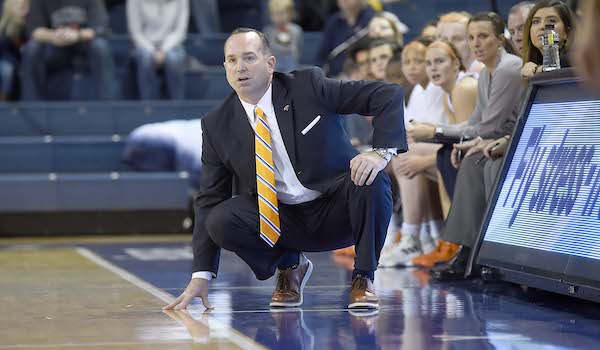Trevor Woodruff was named the new Head Coach at Bucknell University in April of 2019 following four incredibly successful seasons at the Division III level. He was the Head Coach at the University of Scranton, where he led the program to a 113-10 overall record, four consecutive conference championships, and four consecutive NCAA Tournament berths (2018-19 Division III Final Four appearance). Having taken over a successful Scranton program in 2015 and built on that program’s history of success, Woodruff is well-prepared to do the same at Bucknell University.
Can you take us through the interview process and your emotion once you received the call that you would be new Head Coach at Bucknell?
As one might expect from a place like Bucknell, the interview process was efficient and professional. Upon receiving the call from the search firm that I would have a phone interview, the entire process took roughly one week. The initial phone interview was 30 minutes and covered several areas, including some introductory conversation, my vision for Bucknell WBB, and how our previous success might translate at Bucknell.
The following day the search firm called to invite me to campus. At that point things started to become more real for me and my family. Understanding that just a few people would be interviewing on campus, the prospect of leaving our home and starting all over was now a real possibility.
The on-campus interview process was organized and comfortable. I met with many constituencies, including the President of the University, men’s basketball coach, athletic department leadership, and search committee. In total, I spent roughly six hours interviewing and touring campus. Afterward, I felt like I’d done a good job showing what I had to offer Bucknell and why I believed it was a perfect fit.
The following day the call came with the job offer. I could not wait to get off the phone to call my wife. I also knew there would be difficult times ahead as we would be saying goodbye to our current team and those closest to us personally. My immediate attention went to prioritizing what needed to be done to handle the transition with sensitivity and professionalism.
Having arrived at Bucknell, after four successful seasons as a Head Coach at Scranton, what have you learned in the transition from the DIII level to DI?
After roughly five months, I can say with certainty, that things are very different. The amount of moving parts is much greater at this level and the number of administrative decisions on a day to day basis takes significantly more time and attention.
I was fortunate to hire a great staff of motivated, talented professionals at Bucknell, but that too requires time and attention. Making sure we are organized and all moving in the same direction, has required a sharp attention to detail and constant communication.
With taking over another program that has achieved a high level of success, what strategies have you begun implementing to maintain that success, while putting your own stamp on the program?
I feel fortunate to step into a program that has had such great success. It is an understatement to say that Aaron Roussell did a great job. The culture of winning the right way is already in place, so my objectives are very simple: I want to observe and listen, to identify the things that have made the program so successful. There will be obvious changes to the on-court strategies, but maintaining the positive environment is goal number one. I am also working to build strong relationships in all corners of the university so we can provide our student-athletes a supportive, student-centered experience.
After your first few months as a first-time DI Head Coach, what advice do you have for non-Division I head coaches who desire to become a DI Head Coach?
My first piece of advice to any coach is to treat your current job like it is D1. I believe we should always conduct ourselves in the same manner we would if we had the “dream job.”
Secondly, I would invest my time in studying the game of basketball. Since fourth grade, I have tried to absorb as much basketball as possible. Reading books, going to clinics, attending other coaches’ practices, and watching instructional videos have all helped me develop my core beliefs. I spent 20 years coaching at every level from high school junior varsity to junior college to DIII men’s and women’s basketball. The entire time I was looking for ways to get better at the craft of coaching.
Lastly, I’d forget the idea of “chasing” anything. Win every day at the things you have control over. Recruiting, professional development, relationship building, and practice/game planning. When all of those things come together and the opportunity presents itself, you will be ready.

